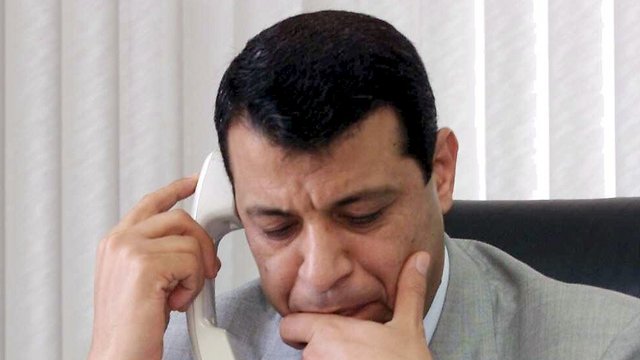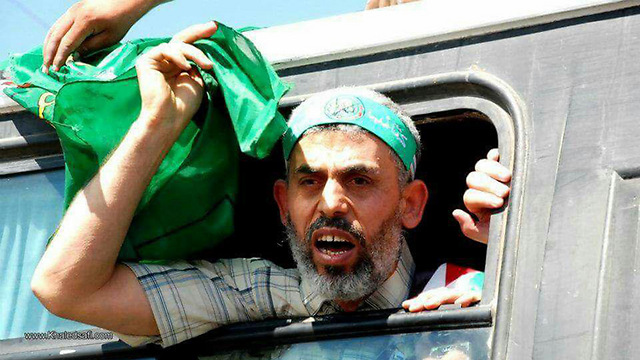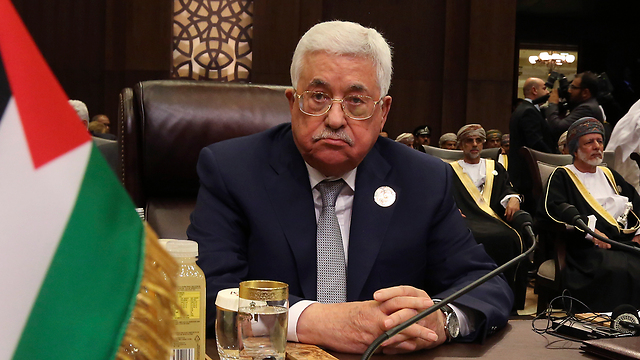


Sanwar and Dahlan: An Egyptian-brokered alliance against Abbas
Analysis: The renewed relationship between the Hamas leader and the former Fatah strongman, who grew up together in the Khan Younis refugee camp, proves that the key for creating change in the Palestinian society is based on strengthening the regional-geographical connection.
From a historical perspective, this is one of the worst moments in the history of the Palestinian national movement. The political-geographical split is making it difficult for the PLO leadership to navigate through the diplomatic route toward the two-states-for-two-people solution, as it committed to in the Oslo Agreements. The alternative Hamas tried to present in the form of jihad collapsed too, leading to a serious humanitarian crisis in the Gaza Strip.

The crisis the two leaderships—the PA and the Hamas—are experiencing obligates them to find solutions that could give the young generation a sense of hope. Naturally, the weakness of the national system and party affiliation makes it possible to create political alliances based on alternative identities. So far, it seems the key for creating change in Palestinian society can be found in the creation of communal alliances around strengthening the regional-geographical connection while bolstering the national connection as well.
That’s the background for the recent Egyptian-brokered unnatural affair between Mohammad Dahlan, who was expelled from Fatah in 2011 but sees himself as Mahmoud Abbas's future successor, and Hamas's newly elected leader, Yahya Sanwar. Dahlan, the former head of the Palestinian Preventive Security Force, was described by the Hamas leadership on the eve of the military takeover of the Gaza Strip in the summer of 2007 as a corrupt person damaging the values of Islam.
From refugee camp to political meetings in Cairo
The parties have surprisingly moved closer not just thanks to a political meeting of interests, but due to traditional cultural identity components, led by the interpersonal connection and the local identity. Sanwar and Dahlan grew up together in the Khan Younis refugee camp, share the refugee mindset and the same background. In addition, there is no history of bad blood between them. Dahlan and Sanwar’s ways parted in the beginning of the first intifada. Since then, until their recent meeting in Cairo, there has been no animosity between the two, but perhaps yearning.
The personal acquaintance and the local identity shared by Dahlan and Sanwar is seen as an asset by Egypt too, which is interested in severing the ties between Hamas's military wing and Islamist organizations in the Sinai Peninsula.
The creation of an economic-political dependence system, which passes through Dahlan and is backed by Sanwar, will make it possible for Egypt to achieve these goals. Thus, the local Gazan identity, which receives a lot of legitimization from Egypt, allows Hamas to find a formula that would make its political survival possible.
For Dahlan, the local identity could serve as a renewed stepping stone to a national leadership position. The purpose of the alliance between Dahlan and Hamas is to lead joint moves that would create a better day-to-day life for the strip’s residents, who are suffering from a shortage of electricity, water and basic civilian infrastructure. Dahlan and the donation money from the Gulf are supposed to fill the void left behind by Abbas. The Palestinian president chose to withdraw funds to harm the Gaza Strip’s bureaucratic systems and civilian infrastructure in an attempt to subdue Hamas, following Sanwar’s efforts to create an alternative government that would neutralize the influence of the Palestinian Authority’s government offices in the Gaza Strip.
Abbas refusing to reconcile
Beyond the rivalry between Fatah and Hamas, the internal Fatah battle between Abbas and Dahlan is personal and filled with bad blood. In the past, Abbas rejected Egyptian attempts to reconcile between the parties, and he is determined to block Dahlan’s way back into Fatah and prevent him from reaching an influential position in the future.
As part of his attempts to try to thwart Dahlan’s return to a political position of power, Abbas initiated last week a meeting with the Hamas leadership in the West Bank, led by Nasser al-Din al-Shaer. The meeting between the Fatah and Hamas leaderships in the West Bank focused on the efforts to reach an intra-Palestinian reconciliation and a solution to the humanitarian crisis in the Gaza Strip. Abbas, like Dahlan and Sanwar, is using communal-regional politics to advance issues of national importance and shape a political agenda.
From the West Bank, the message reached the Gaza Strip. One of the Hamas leaders, Salah al-Bardawil, in response called for a return to the reconciliation path. He said Hamas was willing to cancel the alternative government workers’ council in exchange for setting a general election date and implementing a reform in the PLO’s structure.
Fatah, Hamas and Dahlan are using the local identity to make some gains in the Palestinian national political arena. Local, clan and tribal identity components are usually seen as an obstacle to the national pattern of action. In the Palestinian case, the communal-regional politics is being painted in national and Islamic colors and serving as a future engine of growth, which will have a future key role in the inheritance battles in the post-Abbas era.
Dr. Ido Zelkovitz, an expert on Palestinian society and politics, is a lecturer at the Department of Middle Eastern History, a research fellow at the Ezri Center for Iran and Persian Gulf Studies at Haifa University and a member of Mitvim—the Israeli Institute for Regional Foreign Policies. His recent books are "The Fatah Movement: Islam Nationalism and Armed Struggle Politics," published by Resling in 2012, and "Students and Resistance in Palestine: Books, Guns and Politics,” published soon by Routledge in 2015.

















